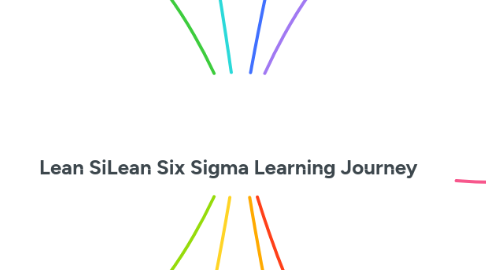
1. - Define Your Objectives
1.1. - Purpose of learning Lean Six Sigma
1.1.1. - Improve process efficiency
1.1.2. - Enhance quality management skills
1.2. - Specific goals
1.2.1. - Achieve Yellow Belt certification
1.2.2. - Lead a Six Sigma project team
2. - Understand the Basics
2.1. - Definition of Lean Six Sigma
2.1.1. - Integration of Lean and Six Sigma methodologies
2.2. - Key principles
2.2.1. - Waste reduction
2.2.2. - Variation reduction
2.2.3. - Focus on customer value
2.3. - DMAIC methodology
2.3.1. - Define
2.3.1.1. - Identify the problem
2.3.1.2. - Define project goals
2.3.2. - Measure
2.3.2.1. - Gather data
2.3.2.2. - Establish baseline metrics
2.3.3. - Analyze
2.3.3.1. - Identify root causes of defects
2.3.3.2. - Perform data analysis
2.3.4. - Improve
2.3.4.1. - Develop solutions to eliminate root causes
2.3.4.2. - Implement and test solutions
2.3.5. - Control
2.3.5.1. - Maintain improvements
2.3.5.2. - Monitor processes regularly
3. - Tools and Techniques
3.1. - Lean tools
3.1.1. - 5S (Sort, Set in order, Shine, Standardize, Sustain)
3.1.2. - Kanban (Visual scheduling system)
3.1.3. - JIT (Just-In-Time production)
3.2. - Six Sigma tools
3.2.1. - Fishbone Diagram (Identifies many possible causes for an effect)
3.2.2. - FMEA (Failure Modes and Effects Analysis)
3.2.3. - Control Charts (Used to study process changes over time)
4. - Levels of Certification
4.1. - Yellow Belt
4.1.1. - Basic understanding of methodologies
4.1.2. - Role in supporting project teams
4.2. - Green Belt
4.2.1. - Advanced analysis and resolution of problems
4.2.2. - Lead small projects or teams
4.3. - Black Belt
4.3.1. - Full-time role as a Six Sigma project leader
4.3.2. - Provide training and coaching to project teams
4.4. - Master Black Belt
4.4.1. - Develop strategies and innovations
4.4.2. - Mentor Black Belts and Green Belts
5. - Training and Resources
5.1. - Recommended books
5.1.1. - "The Lean Six Sigma Pocket Toolbook" by Michael L. George et al.
5.1.2. - "Lean Six Sigma for Service" by Michael L. George
5.2. - Online courses
5.2.1. - Introduction to Lean Six Sigma Principles
5.2.2. - Advanced Statistical Analysis for Six Sigma
5.3. - Workshops and seminars
5.3.1. - Local workshops on Lean tools
5.3.2. - International Six Sigma conferences
6. - Practical Application
6.1. - Suggested starter projects
6.1.1. - Improve customer service process in a call center
6.1.2. - Reduce manufacturing defects in a production line
6.2. - Simulations and case studies
6.2.1. - Online simulation of a manufacturing process improvement
6.2.2. - Case study analysis of successful Six Sigma projects
6.3. - Mentorship opportunities
6.3.1. - Find a Six Sigma Black Belt mentor through LinkedIn
6.3.2. - Participate in mentoring sessions at local chapters
7. - Assessment and Certification
7.1. - Certification bodies
7.1.1. - American Society for Quality (ASQ)
7.1.2. - International Association for Six Sigma Certification (IASSC)
7.2. - Exam preparation resources
7.2.1. - Sample exam questions and answers
7.2.2. - Study guides and preparatory materials
7.3. - Continuing education
7.3.1. - Recertification requirements
7.3.2. - Advanced training courses
8. - Join a Community
8.1. - Forums and online communities
8.1.1. - SixSigmaUsers.net Forum
8.1.2. - Engage in discussions on LinkedIn Six Sigma groups
8.2. - LinkedIn groups
8.2.1. - Lean Six Sigma Connection Group
8.2.2. - Six Sigma Network Professionals Group
8.3. - Local chapters
8.3.1. - Join local ASQ meetings
8.3.2. - Participate in community events and workshops
9. - Review and Adapt
9.1. - Feedback loops
9.1.1. - Regular project reviews with stakeholders
9.1.2. - Incorporate feedback into process adjustments
9.2. - Tracking progress
9.2.1. - Use project management tools to track milestones
9.2.2. - Measure performance improvements regularly x Sigma Learning Journey
